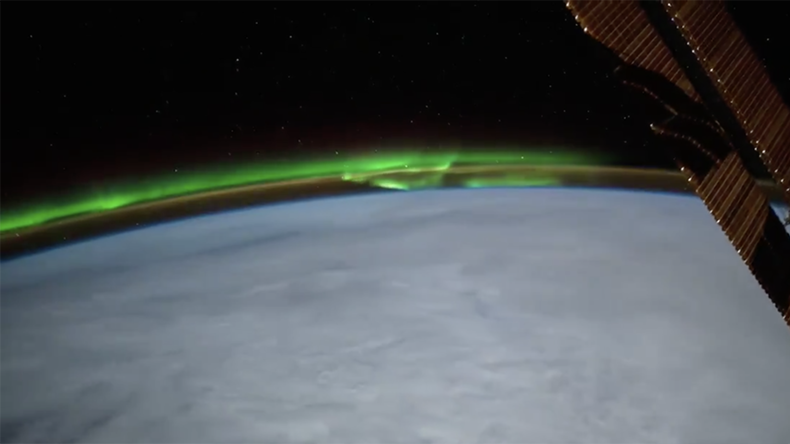Stunning aurora blooms over Earth in astronaut footage (VIDEO)

An astronaut aboard the International Space Station captured footage of a dazzling green aurora gloaming on the edge of the Earth’s atmosphere.
NASA’s Randy Bresnik posted the stunning footage online Friday with the excited message: “My first aurora, ever!”
His video shows the phosphorescent aurora slowly developing on one side of the globe before swirling in a mesmerising green pattern as the ISS moves over Earth.
My first aurora, ever! Looks like a fluorescent green cloud of cosmic smoke wafting over our planet. In a word- Fantasmal! #SpaceVideosRockpic.twitter.com/1kSraXWAqT
— Randy Bresnik (@AstroKomrade) August 17, 2017
Auroras are caused by the collision of particles in solar winds and gases in the atmosphere. On Earth, they are typically spotted from near the magnetic poles and are seen more often in winter when the skies are dark and cloudless.
Former Marine pilot Bresnik blasted off from Baikonur Cosmodrome in Kazakhstan on July 28 for what is his second stint aboard the ISS. He had been to the station aboard the space shuttle Atlantis in 2009.
According to Space.com, Bresnik and his crewmates could see the rare ‘coast-to-coast’ solar eclipse three times as it crosses the continental US on August 21.
READ MORE: 7 of the finest images from Earth’s orbit
“We're going to have a front-row seat to that [the solar eclipse] — 250 miles (400km) closer than you will there down on Earth,” Bresnik told the website.
The ISS orbits the Earth every 92 minutes, meaning the astronauts on board will have more than a few chances to catch the four-hour eclipse
Bresnik’s six-month mission is scheduled to end in December. NASA says the astronaut will perform experiments to test the effect of microgravity on stem cells while on board the ISS.











